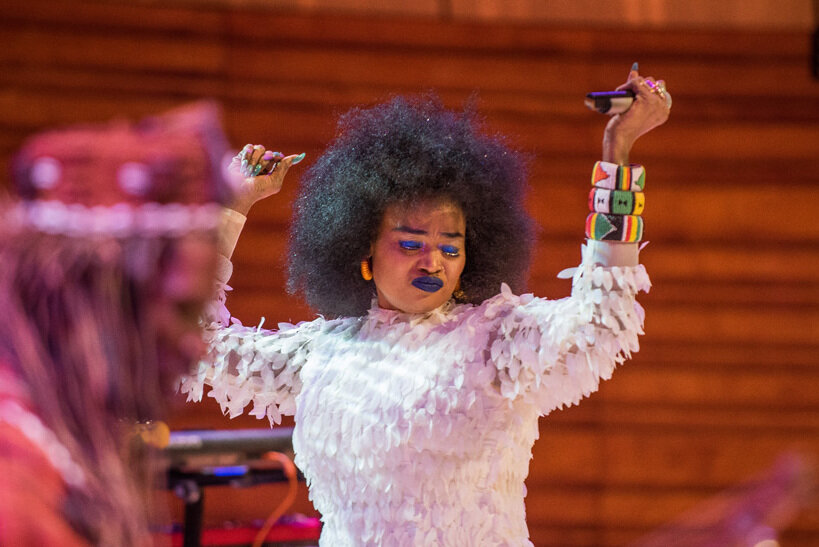Oumou Sangaré performing in 2017. Attribution: WOMEX, CC BY 2.0, via Wikimedia Commons
UPDATE: This song now appears transcribed and translated in the Lyrics Library. Read them here.
This post is a little special. It is both a partial analysis of the lyrics behind Oumou Sangaré’s “Diaraby Nene” and partial response to a comment from Christy, the person who created a YouTube video that includes the song along with her transcription and translation of the lyrics. I ni ce, Christy! :-)
[NOTE: This post builds on this earlier post that highlighted two videos that write out the Bambara lyrics of music by Oumou Sangaré and Sidiki Diabaté.]
Refining the interpretation of the lyrics
My analysis is not about the content of the song really, but rather just an attempt to properly transcribe or typeset the original Manding lyrics.
Christy’s version is a great start, but there’s a few places where I had some doubts or potential corrections. I mentioned some of these in the earlier post linked at the top of this post. Christy then followed up with a few questions. This led me to rewatch the video a number of times and take some screenshots so that I could both respond to her questions and perhaps offer a few corrections and/or alternative interpretations.
In a few cases, I may be off as well — yafa n ma dɛ! — but this was fun for me to do and I hope it’s helpful. If anyone knows of other attempts to write out the lyrics (perhaps Oumou herself has published something), let me know!
My Mark-Up
Here are all of my screenshots as a slideshow gallery:
My Write-Up
Word Boundaries and other spelling issues
I have flagged a few of the questionable or debatable word boundary issues with some marked-up screenshots. Here’s a few examples, but look through the screenshots for more mark-up.
Nɛnɛko (1:31; SS 4)
I would write this as one word since it’s a tonally compact noun that literally means ‘the affair/matter of cold’
Mɔgɔ bɛ kɛ mɔgɔ fɛ… (2:39; SS 7)
You translate it as an imperative or command, but the syntax, for me, means that it’s a general statement about people → “People love people…”
“Fali ma deli si dɔn” (2:54; SS 8)
I’m not aware of this expression and I’m having trouble parsing it. If it’s dèli ‘to be/get used to’ than normally one would expect a postposition following a noun, but perhaps it could be left off as part of elision that comes with singing maybe? Either way though, what is “si dɔn” — why did you gloss it as ‘feelings’? Could it be one word sidɔn in the sense ‘understanding’?
“Hami na…” (2:54; SS 8)
It’s clearly the word hami for worrying etc., but I’m not sure what is going on. Are you thinking that it is:
Hami na nɛnɛ la
worry FUTURE cold to.place
Seems possible, since Oumou uses “l” in place of “d” elsewhere also. (The verb is normally k’à da in Bamanan, k’à la in Maninka and Jula etc.)
Word Questions (from Christy)
“Maana” (1:31; SS 4)
It is man’à actually, which written out in full would be mana à:
N man’à fɔ “Nɛnɛ” → ‘When I say “cold”...’
Here’s the entry for mana in the AKT dictionary.
Dawula
This word is in Bamadaba.
Sumu (2:20; SS 6)
Bamadaba lists sùmu as ‘veillié’ which can either be ‘vigil’ or ‘all-night party’ in French.
I’m not familiar with this word, but it seems plausible or right. It shows up at 2:54 (SS 8) — I put a question mark there, but now your translation makes sense to me.
Bɛrɛ (1:20; SS 3)
This is the right word, but in the case of fabɛrɛ and babɛrɛ, they should arguably be written as single words since they are 1) compound nouns and 2) lexicalized — that is, they have a particular meaning of being one’s birth father or mother that can’t be deduced just from combining fa and ba with bɛrɛ.
Solo (1:20; SS 3)
There’s a sòlo for ‘protection’ in Bamadaba. I’ve never encountered or used this word so not sure if it is the one in question at 1:20 (SS 03).
Why should we think that it is a different sòlo than the one for ‘pelvis’ that shows up in the following line? There’s likely a range of expressions using that sòlo — just like you flagged it in one place as related to a gesture of humility.
Jɔn (3:57; SS 9)
I believe that this is simply the word jɔ̀n for ‘slave’, but that is coming from the general Muslim context where it means ‘servant; one submitted to God’. Here it is just being used in general to refer to any person since it’s an expression used in a context where everyone is presumed to be Muslim. What do you think?
In that sense, it would be:
Jɔn bɛɛ ni (à) dankan
To each his or her own destiny.
Wanna understand the Bambara language lyrics of music from Mali?
I made an online Bambara course for beginners!
(I also do private lessons for more motivated or advanced students!)












